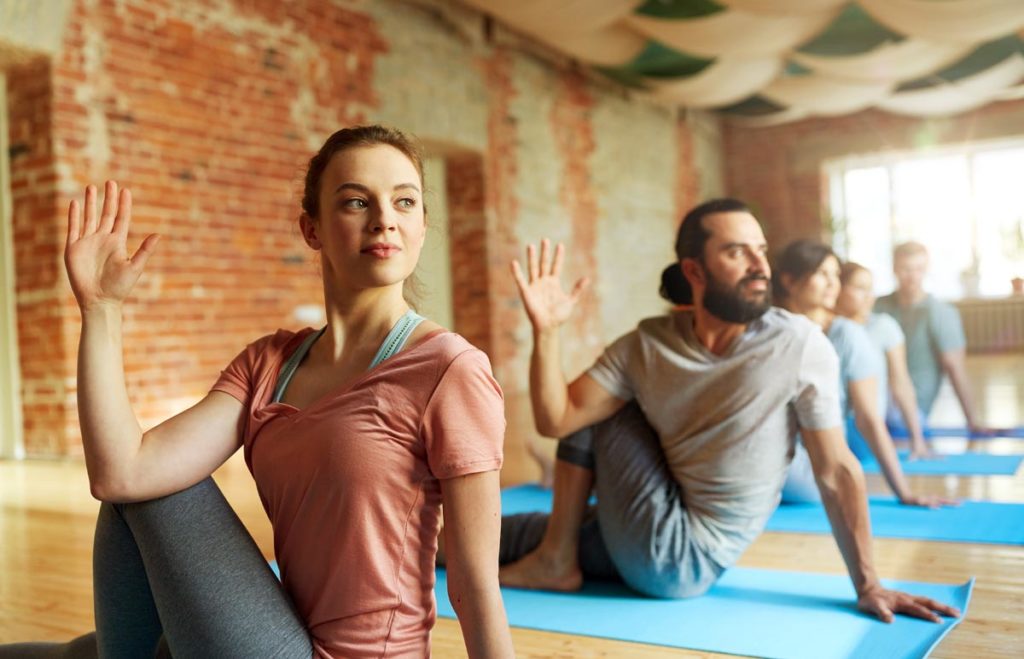When you think of yoga, there’s a good chance you think of difficult poses that are utterly impossible to perform. Yoga has been around since 3,000 BC. The word “yoga” means “yoke” in the original Sanskrit language of the Indians who invented it. Anyone can get into yoga stretches if they ease their way into it. While yoga is often thought of as a physical activity, it actually benefits all aspects of health, including mental and emotional well-being.
One area where yoga can make a significant impact is addiction recovery. Yoga has been shown to help people struggling with addiction by promoting mindfulness, reducing stress and anxiety, and improving physical fitness and balance. At Texas Recovery Center, we offer an addiction treatment wellness program incorporating yoga as a critical component. Our program is designed to help you achieve and maintain lasting sobriety while addressing addiction recovery’s physical, emotional, and mental challenges.
Don’t hesitate to reach out to us today at 844.230.5931 to learn more about the benefits of yoga in addiction recovery.
The Eight Limbs Of Yoga
The eight limbs of yoga are the paths that your yoga practice will take: physical stretches and breathing are only two aspects. Breaking them down will show how effective yoga is to a dedicated person in recovery. They are helpful to consider in addiction because they help you maintain a clear mind and healthy behaviors. They include:
- Yamas – These ethical guidelines of yoga encourage you to act with integrity and respect for others.
- Niyamas – These are personal guidelines that promote wellness, such as practicing cleanliness or cultivating a positive outlook on life.
- Asanas – This is the actual physical practice of yoga, which benefits your flexibility and strength.
- Pranayama – This is the practice of controlling and directing your breath, which can help you overcome addiction cravings by giving you greater mental control over your behavior.
- Pratyahara – Involves turning inward and practicing mindfulness to improve your self-awareness.
- Dharana – This focused concentration can help you stay in the present moment and resist temptations that lead to addiction relapse.
- Dhyana – Benefits your mental clarity and helps you maintain a positive outlook despite complex challenges.
- Samadhi – This is the ultimate state of mindfulness when you achieve a complete sense of calm and balance in your thoughts, emotions, and actions.
As you can see, yoga benefits every aspect of addiction recovery. So if you’re looking for an effective way to overcome addiction and maintain sobriety, consider adding yoga to your recovery program. At Texas Recovery Center, we offer a range of evidence-based addiction treatment programs that incorporate yoga as a key component.
The Benefits of Yoga in Addiction Recovery
Even with the eight limbs, it’s hard for many people to imagine how stretching and breathing can help them beat addiction. But it’s true. Yoga is an excellent coping tool, and the following are just a sample of the benefits yoga will offer to your recovery:
- Physical – You will feel stronger and more flexible after every exercise. Any aches and pains you may feel from your withdrawal will decrease as you stretch through them.
- Stress-reduction – The calm breathing exercises, gentle motions, and meditative benefits of yoga can help calm your nerves, reduce cravings, and help treat any psychological distress or trauma you may feel regarding your addiction.
- Improved circulation – Better circulation lowers your blood pressure and risk of heart disease, increases oxygen flow to your brain, improves mood, and helps you think more clearly.
- Emotional – More peace of mind comes to just about everyone who performs yoga, giving you access to new and healthier coping mechanisms. Instead of drugs or alcohol, you can turn to the calming breathing exercises inherent in yoga.
- Increased self-discipline – Learning how to say “no” to addiction is challenging, but the challenge of committing to yoga can give you the new discipline you need to stay clean for the rest of your life.
- Inner peace – The spiritual benefits of yoga extend beyond the bounds of all religions and can be used to enhance inner peace in any particular belief. Like the 12-Step program, it asks only that you believe in a higher power and never dictates the exact power.
If you want to overcome addiction, yoga is a tried-and-true method that can positively change your life. To learn more about our addiction treatment programs, call Texas Recovery Center today. We offer flexible and affordable options for everyone in need of wellness.
Yoga Poses You Can Use in Recovery
Although yoga poses benefit your recovery, this particular sequence is suitable for beginners. It will challenge your body and mind and give you the relaxation you need to recover from addiction.
Mountain Pose
Start every yoga routine with this pose to give it a nice circular feel. Stand with your feet shoulder-width apart and press your palms together in front of your chest. Close your eyes and breathe slowly, calming your mind before moving into the next pose.
Triangle Pose
Slowly move your legs apart until they are in a reverse V-shape. Pull your arms up parallel to the ground and turn your head to look out past your right fingertips. Bend right at your waist and draw your right hand down while twisting your waist forward. Pull your left hand in the air and hold it in a “triangle” shape for 15-30 seconds. Release, return to the original pose, switch to the left, and repeat. Once you’re done, come back to mountain pose.
Leg Wall Pose
Move from a standing position to a sitting position and lie back with both legs pressed against the wall. Pull up so your behind, touches the wall, and let your legs relax. Straighten your legs to get the full effect.
Spinal Twist
Add this pose to the end of your routine by lying on your back and pulling your knees close to your chest. Put your arms to your side, palms up, and move your knees left as far as you can. Hold for five seconds, return to the center, and go to the left.
Corpse Pose
It ends each round of yoga and lets you relax and feel the benefits of your practice. Lie down on your back with your feet and legs apart, close your eyes, and gently breathe. Once you’re done, open your eyes, and take stock of yourself.
A successful yoga routine leaves you feeling great. Your body will be pain-free, and your mind will be relaxed and comfortable. And addiction is nowhere in your mind when you feel that good.
Why Choose Yoga for Your Addiction Treatment?
If you are struggling with addiction, you may wonder if yoga can help. Yoga has been shown to be an effective tool for managing stress, improving mental and emotional well-being, and gaining insight into oneself. Here are three reasons why yoga may be a valuable part of your addiction treatment program:
- Yoga can help you develop a healthy coping mechanism for stressful situations.
- Yoga can help you to become more aware of your thoughts and feelings, which can help conquer negative thinking patterns that may contribute to your addiction.
- Yoga can help you to build strength and flexibility, both physically and mentally. This can lead to improved self-esteem and body image, which can be important in the recovery from addiction.
If you are ready to take control of your addiction and begin the journey to better health, consider yoga as part of your treatment plan. At Texas Recovery Center, we offer comprehensive wellness programs incorporating a wide range of holistic approaches, including yoga, to help you achieve your recovery goals.
Incorporate Yoga into Your Addiction Treatment Program at Texas Recovery Center
Yoga is a powerful and beautiful way to ease your way through recovery and gain the peace of mind you need to beat your addiction. Texas Recovery Center offers comprehensive wellness programs to address your needs, challenges, and goals. Whether you need outpatient treatment or residential care, our expert team will work with you one-on-one to develop a custom program that works for you. Please contact us at 844.230.5931 to learn more about yoga’s benefits in addiction recovery.












